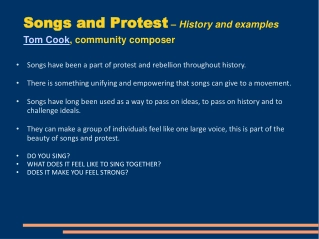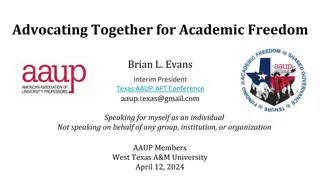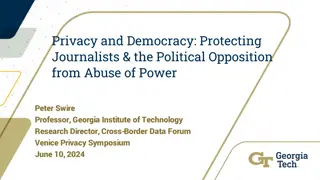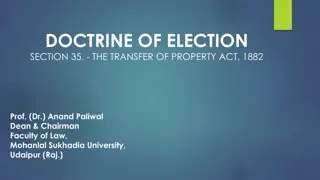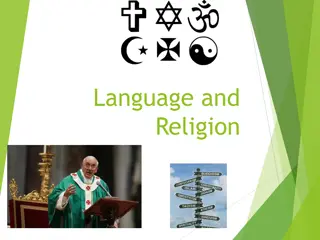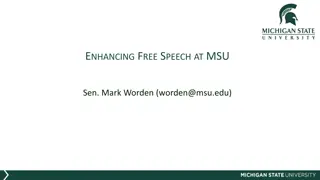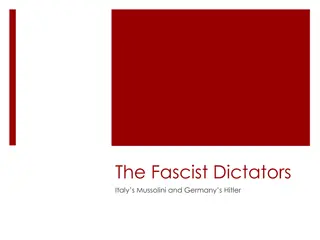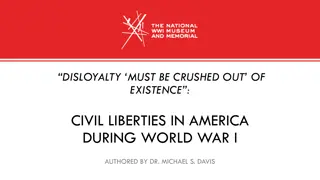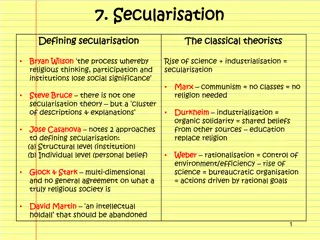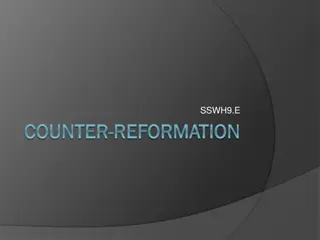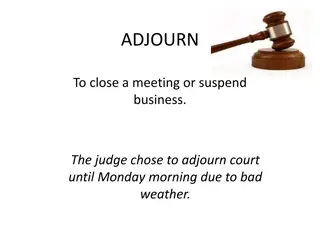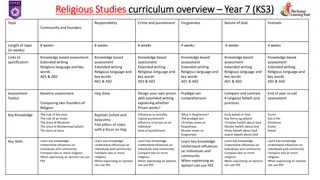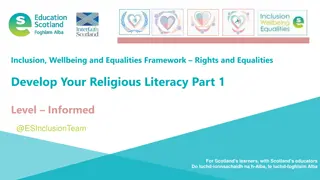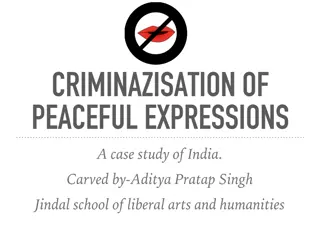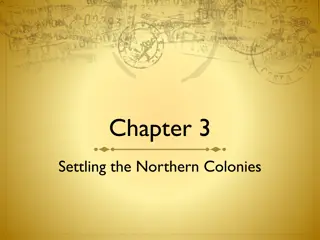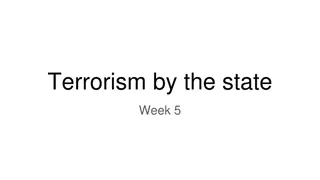Songs and Protest
Explore the deep-rooted connection between songs and protest throughout English history. From the traditional rebel song "The Cutty Wren" depicting the Peasants' Revolt in 1381 to the revolutionary actions of "The Diggers" in 1649, these songs have served as powerful tools for conveying dissent, cha
3 views • 12 slides
Status of Family Laws in India: Hindu vs. Religious Minorities
The family and personal status laws in India vary between Hindu law and those pertaining to religious minorities. While Hindu law has seen extensive reforms, discriminatory provisions still exist. In contrast, laws governing religious minorities have undergone fewer reforms, leading to greater inequ
2 views • 4 slides
Advocating Together for Academic Freedom - Importance and Principles
Advocating for academic freedom is crucial for the advancement of knowledge and quality education. The American Association of University Professors (AAUP) champions academic freedom, shared governance, and economic security for faculty members. The 1940 Joint AAUP/AAC&U Statement of Principles on A
4 views • 14 slides
Advocating Together for Academic Freedom in Higher Education
Advocating for academic freedom and shared governance in higher education, the American Association of University Professors (AAUP) upholds principles of free inquiry, expression, and dissent. Joining AAUP allows faculty members to champion for economic security and quality education, supported by s
1 views • 10 slides
Privacy and Democracy: Safeguarding Journalists and Political Opposition
Panel discussion on the importance of privacy as a structural safeguard for democracy, emphasizing protections against abuse of power by temporary leaders. Focus on special privacy measures for political opposition and journalists to uphold free speech and dissent. Historical context and future cons
1 views • 13 slides
Understanding Religious Conflict: Definition and Types Explored
Religious conflict is a complex and recurring concept throughout history. Scholars have defined it as disagreements between religious groups. This conflict arises from contentious issues touching on ideology, morality, power, and identity, influenced by various socio-political, economic, and cultura
1 views • 13 slides
Evolution of Akbar's Religious Policy: A Historical Overview
In the 16th century, Akbar the Great implemented a revolutionary religious policy in the Mughal Empire. Initially a devout Sunni Muslim, Akbar evolved his stance to promote harmony and equality among all religions, fostering tolerance and understanding. This shift marked a significant departure from
0 views • 25 slides
Doctrine of Election under Section 35 of the Transfer of Property Act, 1882
The doctrine of election under Section 35 of the Transfer of Property Act, 1882 deals with situations where a person professes to transfer property he does not own, and the owner must elect to confirm or dissent. If the transfer is gratuitous and the transferor is unable to make a fresh transfer, th
5 views • 17 slides
Elizabethan Religious Settlement: Unity Amidst Division
Amid religious division in England, Queen Elizabeth I implemented a Religious Settlement in 1559 to unify the country. The settlement, a blend of Protestant and Catholic elements, aimed to maintain peace and prevent rebellions. Elizabeth's strategic compromise pleased most people, though lingering t
0 views • 14 slides
Understanding Secularism: Principles and Advantages
Secularism is the principle of separating government institutions from religious entities to ensure equal rights for believers and non-believers. It safeguards freedom of religious belief and practice, upholds religious freedom, and promotes democracy and fairness. Secularism aims to prevent religio
0 views • 21 slides
Understanding Religious Language: Cognitivism vs. Non-Cognitivism in the University Debate
This discussion explores the debate between cognitivism and non-cognitivism in religious language. Cognitivism asserts that religious claims aim to describe the world and can be true or false, while non-cognitivism argues that such claims express attitudes and cannot be verified. Flew's challenge qu
0 views • 9 slides
Understanding Wartime Propaganda in WWI
Wartime propaganda during WWI was employed for various purposes such as recruiting soldiers, financing the war effort, and unifying the country. It used tools like demonization, emotional appeals, patriotic appeals, and half-truths to sway public opinion and support the war. An in-depth analysis of
0 views • 7 slides
Guide to Using the BSA Calendar of Religious Observances
The BSA Calendar of Religious Observances is a valuable resource for scheduling scouting events in consideration of various religious holidays and observances. This guide provides an overview of the calendar, highlights important dates, and emphasizes the importance of respecting religious diversity
0 views • 8 slides
Understanding the Role of Language in Religion
Exploring the significance of language in religious contexts, this content discusses the functions, features, lexicon, grammar, and metaphorical aspects present in religious language. It delves into how religious language upholds spiritual beliefs, persuades believers, and expresses specific attitud
0 views • 8 slides
Advocating for Social Action and Justice in India
Advocating for social action and justice is crucial in India, where various issues such as accountability, truth, and justice, as well as dissent, inequality, and oppression, are prevalent. The call for accountability is highlighted through the need for public inquiries and commissions to investigat
0 views • 12 slides
Ensuring Free Speech Rights at Michigan State University
Michigan State University's Trustees emphasize the importance of protecting free speech on campus. The university's philosophy supports campus dissent, promoting a healthy exchange of ideas. Recent incidents, like protesters disrupting a speaker's event, raise concerns about safeguarding free speech
0 views • 11 slides
Understanding the Cultural Dimensions of Food and Religious Influences in Culinary Arts
Explore the impact of religious beliefs on food traditions and dietary restrictions across different cultures in the culinary world. Learn about the influence of major world religions on eating habits, food choices, and culinary practices. Discover how various religious groups, such as Christians, o
0 views • 26 slides
The Era of Vargas and the Estado Novo (1930-1945)
Getúlio Vargas's rise to power in 1930, the challenges he faced, his adept political maneuvering, and the consolidation of his authority marked a transformative period in Brazilian history. Vargas's regime navigated through economic crises, political dissent, and regional rivalries, shaping Brazil'
0 views • 20 slides
The Vital Role of Religious Institutions in Supporting Immigrants
Religions and immigration are interlinked in modern societies, where religions play a significant role in providing services, defending rights, and supporting the social cohesion of immigrants. Mainstream religious institutions serve as key actors in offering assistance, advocating for migrant right
2 views • 14 slides
Understanding Religious Language: Flew, Hare, Mitchell
Exploring the contrasting views of cognitivism and non-cognitivism in the context of religious language through the perspectives of Flew, Hare, and Mitchell. Delve into Flew's challenge on the undetectable gardener, Hare's concept of bliks, and Mitchell's response to the rationality of religious bel
0 views • 7 slides
Religious Accommodation in the Army: Advising Command
The content discusses the role of the Chaplain Corps in advising Soldiers and leaders on religious accommodation in the Army as of February 13, 2019. It covers learning objectives, legal foundations, Army policies, procedures, recent changes, and references related to religious accommodation. The in
0 views • 36 slides
The Rise of Fascism in Italy: The Reign of Mussolini
Italy's post-World War 1 chaos paved the way for Mussolini's rise to power as a dictator. Using violence and intimidation, the Fascists dismantled democracy, centralized power, and promoted extreme nationalism and militarism. Despite promises of order and greatness, Mussolini's regime suppressed dis
0 views • 22 slides
The Red Scare and McCarthyism: Cold War Repression in America
The Red Scare and McCarthyism were periods of intense anti-communist hysteria in the United States during the Cold War. The fear of communism led to government policies that restricted dissent, fueled by figures like Senator Joseph McCarthy who made unfair allegations and targeted various groups. Th
0 views • 13 slides
Civil Liberties and Dissent in America: World War I and Beyond
Civil liberties in America during World War I were challenged as state and local governments suppressed anti-war sentiments, leading to the transformation of the Justice Department to counter-subversive actions. Organizations like the NCLB fought for freedom of expression, culminating in the creatio
0 views • 36 slides
Understanding Religious Discrimination Laws in California Workplace
Learn about the regulations and protections under FEHA and Title VII in California, including religious exemptions, accommodation requirements, case studies, and best practices to address discrimination issues effectively. Discover the statistical insights on religious discrimination complaints and
0 views • 45 slides
Understanding Secularisation: The Decline of Religious Influence in Society
Secularisation refers to the process in which religious thinking, participation, and institutions lose their social significance. This phenomenon is influenced by factors such as the rise of science, industrialisation, changing social attitudes, and the disengagement of the church from society. Evid
0 views • 8 slides
Philosophers' Views on Religious Experience: Insights and Critiques
This lesson delves into the perspectives of various philosophers such as Rudolph Otto, Richard Swinburne, John Hick, and Michael Persinger on religious experiences. It explores concepts like the numinous, religious knowledge, God's existence, and criticisms on the validity of religious experiences.
0 views • 7 slides
Philosophers' Views on Religious Experience: Insights from William James
Explore William James' perspective on religious experiences, including his views on existential and value judgments. Understand how James argued for the validity of religious experiences and their potential proof of God's existence. Delve into the implications of emotions and prior beliefs on interp
0 views • 7 slides
Religious and Social Conflicts Fueling the Rise of Absolutism in Europe
Social, economic, and religious conflicts in Europe played a significant role in the emergence of absolutism where monarchs wielded supreme power without sharing it with legislative bodies. Events like Spain's religious conflicts, Protestantism in England, the Spanish Armada, religious conflict in t
0 views • 10 slides
Reformation and Counter-Reformation in the Catholic Church
Catholic rules during the Middle Ages granted immense power to the Pope, sparking dissent that led to the Protestant Reformation. The Counter-Reformation was the Catholic response to Protestant criticisms, leading to the Council of Trent in the mid-16th century to reaffirm Catholic doctrines and pra
0 views • 14 slides
Religious Pluralism and Civil Society: A Paradox in Government Control
Understanding the intricacies of religious pluralism in the context of government control reveals a paradox where restricting religion can hinder social cohesion and economic growth. Through insights on the counterproductivity of control, the role of religious organizations in civil society, and the
0 views • 16 slides
Enhancing Your Vocabulary: Legal Terminology Explained
This content provides explanations and examples of legal terms such as "adjourn," "censure," "dissent," "exonerate," "extemporaneous," and "extricate," illustrated with vivid imagery. Learn how these terms are used in various contexts to deepen your understanding of legal jargon.
0 views • 10 slides
US Religious Freedom Restoration Act (RFRA) Overview
The US Religious Freedom Restoration Act (RFRA) aims to protect the free exercise of religion by ensuring that governments do not substantially burden religious practices without compelling justification. It emphasizes striking a balance between religious liberty and governmental interests through t
0 views • 9 slides
Religious Studies Curriculum Overview for Year 7 and 8 (KS3)
Explore various topics such as responsibility, crime and punishment, forgiveness, nature of God, festivals, community, founders, worship, creation, life after death, rules and laws, relationships in this detailed Year 7 and 8 (KS3) Religious Studies curriculum. The curriculum includes assessments, e
0 views • 6 slides
Protests in Marseille Turn Deadly: 80-Year-Old Woman Killed by Tear Gas Canister
An 80-year-old woman died in Marseille after being hit by a tear gas canister during fuel protests. The protests, initially against fuel tax, have escalated into wider discontent over living costs. The woman was hit in the face at her window, succumbing to injuries despite hospitalization. The movem
0 views • 20 slides
Nazi Control in Germany: The Dark Reign of the Police State
The Nazis implemented a strict regime of control in Germany through censorship, propaganda, and the establishment of a powerful police state. They used organizations like the SS, Gestapo, and SD to suppress dissent, monitor the population, and silence opposition. The legal system was manipulated to
0 views • 8 slides
Developing Religious Literacy for Educators in Scotland
This resource aims to enhance educators' understanding of religious literacy by exploring religious discrimination, core beliefs of major faiths, and additional learning sources. It encourages educators to consider the needs of learners in relation to their religious beliefs in Scotland.
0 views • 30 slides
Criminazisation of Peaceful Expressions: A Case Study of India
Indian governments use laws like sedition and defamation to stifle dissent, despite PM Modi's call for free speech. The sedition law, a colonial-era relic, is used against activists and critics, with vague language allowing misuse. Famous cases, including the arrest of Kanhaiya Kumar, highlight the
0 views • 13 slides
Settling the Northern Colonies: Religious Transformation and Colonization
The Protestant Reformation led to the emergence of Puritanism in the Northern Colonies, with figures like Martin Luther and John Calvin shaping religious beliefs. The Massachusetts Bay Colony stood as a beacon of self-government and religious ideals, while dissenters like Anne Hutchinson and Roger W
0 views • 9 slides
Understanding State Terrorism and Its Implications on Society
State terrorism, employed by governments or factions within them, poses a grave threat to citizens and international peace. This form of terrorism includes intimidation, coerced conversion, and genocide as tools to maintain control. Dictators find it easier to carry out state terrorism in secret, of
0 views • 7 slides
